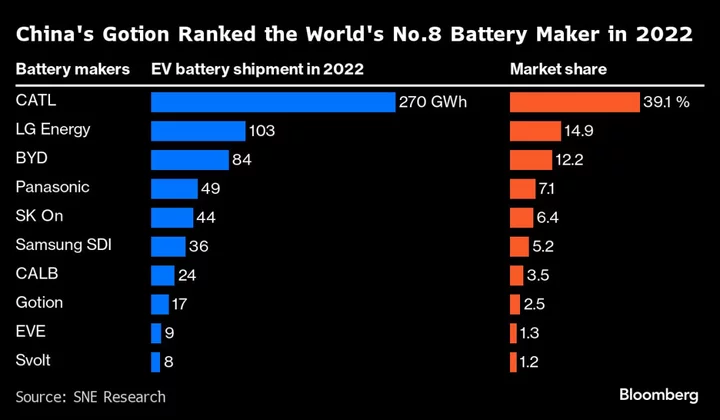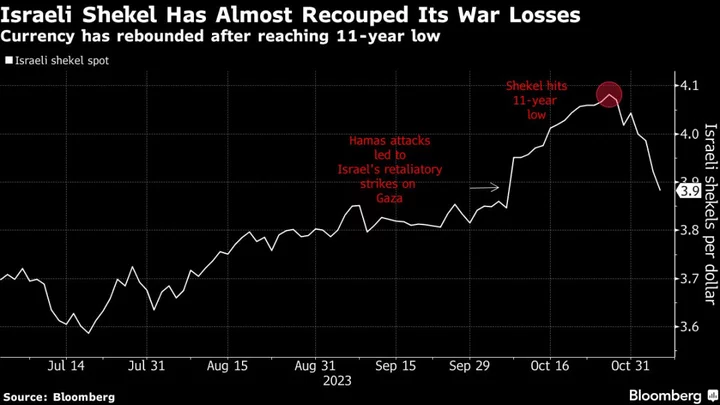Corporate America is waking up to what higher interest rates really mean.
Companies across the credit spectrum are facing sharply higher financing costs after the Federal Reserve raised its benchmark rate for ten consecutive meetings, bringing it to a range of 5% to 5.25% earlier this month. That sticker shock is leading some businesses to look for savings, while others are tapping new, alternative funding sources.
Slower economic growth combined with continued inflation adds to the challenge, as companies not only face higher costs, but also expected declines in revenues and profits.
Interest costs at US companies rose by nearly 20% on average in the first quarter compared to a year earlier, according to a sample of about 1,700 businesses from data provider Calcbench Inc. Oracle Corp., for example, reported $908 million in interest spending during the quarter ended Feb. 28, compared to $667 million a year earlier.
For junk-rated companies, the situation is even more dire as they often have lower cash balances and fewer levers to pull. Cruise operator Carnival Corp., which loaded up on debt as travel ground to a halt at the start of the pandemic, recorded $539 million in interest expenses in the first quarter, up from $368 million in the prior-year period. The company said its debt will come down over time and that free cash will alleviate interest expenses. Oracle didn’t immediately respond to a request for comment.
“All-in costs are much higher, for everyone,” said Gregg Lemos-Stein, chief analytical officer for corporate ratings at S&P Global Ratings. “It’s all about the base rate,” he said, pointing to the increase in the federal funds rate. Based on their ratings, companies may pay significantly more than that when they take out new debt or refinance. There are hundreds of billions of dollars in corporate debt coming due in 2023, 2024 and 2025, according to S&P.
Companies’ ability to deal with higher interest costs varies, depending on the strength of their balance sheets. Swallowing that increase in interest is “easier for a BBB-rated company than one with a single B,” Lemos-Stein said, adding that the hit from higher rates is being felt more on the lower end of the credit spectrum.
And while companies can hedge some of their rate exposure, those protections don’t last forever. “You are trying to ride over this hump until rates are coming down again,” said Joseph Neu, founder and chief executive officer of NeuGroup Inc., which runs membership groups for treasurers.
Markets have been betting on rate cuts later this year. The timing of eventual cuts is crucial for companies with weaker balance sheets: “If we aren’t going down the other side of the hump soon, we will see more buying opportunities for people in distressed debt,” Neu said. Already last year, triple-C rated companies reported negative free operating cash flow to debt ratios — a warning sign for other businesses — according to S&P.
Some companies are seeking new sources of funding now. Internova Travel Group, a high-end travel agency, turned to the private credit market earlier this year to refinance debt originally arranged by Morgan Stanley that was set to mature in 2024. The $665 million loan, which was led by HPS Investment Partners, pays more than double the interest rate margin the company had locked in five years ago — even though some of it can be deferred until the loan’s maturity.
At Internova and elsewhere, private credit is providing capital where other lenders won’t. But in some cases, the fix may only be temporary.
“There has been an absolute explosion in balance sheets that are no longer tenable if you refinance them in today’s interest rate environment,” Josh Friedman, co-founder of Canyon Partners, said earlier this month. “You’ve got balance sheets with, generally speaking, five, six or seven turns of leverage where every dime of cash flow — and then some — will get consumed by interest.” Internova didn’t immediately respond to a request for comment, while HPS declined to comment.
Elsewhere:
- Lower-rated companies looking to refinance loans are running into a serious hurdle: some of their biggest investors are restricted from putting money to work. Managers of collateralized loan obligations face a limited period of buying and selling more freely in their portfolio. Usually, they can reset that period, but doing so has been more difficult lately as pricing on the bonds they sell has widened.
- Hedge funds looking to trigger payouts on derivatives tied to Credit Suisse Group AG are clashing with investors that piled into a different hot trade — that the bank’s credit quality will converge with rescuer UBS.
- Junk bond investors are scrutinizing corporate bonds with upcoming maturities — trying to pick out which firms will refinance early so that they can reap a fat return.
- Companies are going bankrupt at the fastest pace since 2009 and there’s no end in sight as rates rise and the economy sputters.
- A fresh showdown is emerging between banks and private credit funds as they compete head-to-head to finance deals in a nascent recovery in leveraged buyouts.
- China’s troubled real estate sector added another name to a long list of offshore defaulters: a developer that recently received government aid on a bond deal. KWG Group Holdings Ltd., which sold a state-backed onshore note in January, said it didn’t pay $119 million of principal, constituting a default. The payment miss raised fresh doubts about the efficiency of state help for the beleaguered sector.
- Also in China, pressure is mounting for dollar bond defaulters to show restructuring progress, as another firm that failed to do so faces court-ordered liquidation. Dangdai International Investments Ltd. received an order to dissolve from a Hong Kong court — despite saying it’s working on a plan to resolve debt issues.
--With assistance from James Crombie.









